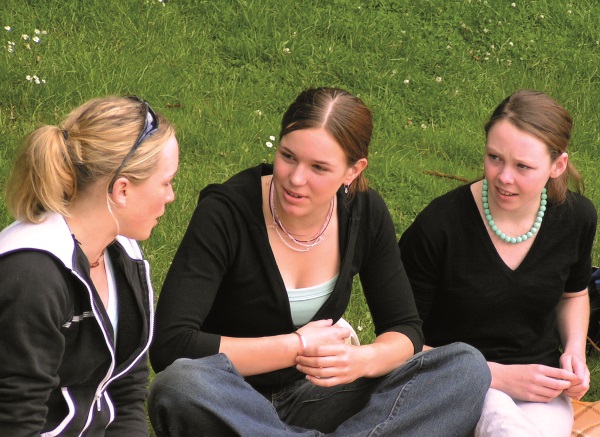For Children’s Mental Health Week, two colleagues share their experiences of having friends and family with mental health difficulties.

This important week has made me reflect on my own experiences of being a sibling of someone with mental health difficulties, and why it is always better to talk.
Tom was diagnosed with schizophrenia at 18, I was 16, and I have to say an actual diagnosis was, I guess, a sort of relief for my family. We’d known something was up for a number of years and before the diagnosis it had been an incredibly turbulent period. That’s not to say it immediately got better, that was definitely not the case. He was in and out of hospital for years and, whilst doing incredibly now, it is something that ultimately will never go away.
I remember having so many questions and was a mess of so many different feelings: fear, guilt, anger, worry. I didn’t really want to talk about it and although we had an amazing family support worker, talking to my friends or school about it was extremely hard.
A couple of years ago, I took part in a focus group with other people who have experience being a sibling of someone with a mental health difficulty. I have to say it was a really amazing experience. I’d never really had the opportunity to speak frankly with people who were in a similar situation to me and who knew where I was coming from.
The research from those focus groups has led to the development of the Siblings Network including the fantastic Youth Siblings Network.
I think it’s worth reflecting on pupils at your school and whilst you are probably very aware of those struggling with mental health issues themselves, what are you doing to support the siblings of these pupils?
The links I mention above are really great sources of information but also YoungMinds is an excellent site.
I hope you’ll take time over the next week to talk to all your students about mental health because, ultimately, it is always better to talk.
When you’re 16, you’re supposed to be wild. Staying out late and drinking too much is the social norm and we’re all weak with peer pressure. It was hard, very hard, to admit to friends that you didn’t want to go out clubbing and drinking when the cries of ‘you’re boring’ or ‘don’t be so sensible’ echo in your head.
I had one friend who always seemed so strong. She would come early to parties and leave early too, always saying her mum demanded her back by a certain time. She would never drink as much as everyone else or take as many risks. She got called boring, too sensible, she gave in to her mum too much, but I always admired how much she stuck to her guns.
Having mental health difficulties was glamorised when I was a teenager. It was the age of ‘pop-goth’ and we all believed if we had black hair, looked moody and listened to Evanescence then that made us dark, interesting and mysterious. The truth was that very few of us had any real problems at all and the effect soon wore off.
It was only a few years ago, but years after our ‘punk-goth’ phase, that my friend told me what was actually going on all those times she had gone home early. She has anxiety. It goes in waves but sometimes it can be quite severe. Any situation that makes her feel out of control is terrifying and she just wants to be somewhere safe. She never left parties early because she was boring, it was because she knew, if she stayed, she wouldn’t know what would happen. But if she left right now she could get home, would have had a fun night and everything would be fine. But telling us that was far, far scarier than having a sensible reputation.
Her anxiety will never completely go away. There are triggers, some of them she can predict and put in place measures to try and stop them, but sometimes attacks will come out of nowhere. She once told me that she was so anxious about something that, completely unconnectedly, she got to a train station and could not board the train. When her anxiety levels are that high then a completely normal, everyday decision is too much.
Now all of my friends know. Nobody thinks she’s boring or too sensible – she parties way harder than most of us and she can do it sober! But sometimes, something happens and as a group of friends we need to learn how to react and how best to support her. We’ve had to learn this by growing up with her and she had to be brave enough to tell us what was going on. We were never told about it in lessons and she was never supported at school.
It makes me very thankful that Children’s Mental Health Week exists and we are breaking down the stigma attached to mental health. The more we talk, the more we learn and young people don’t have to do it on their own.